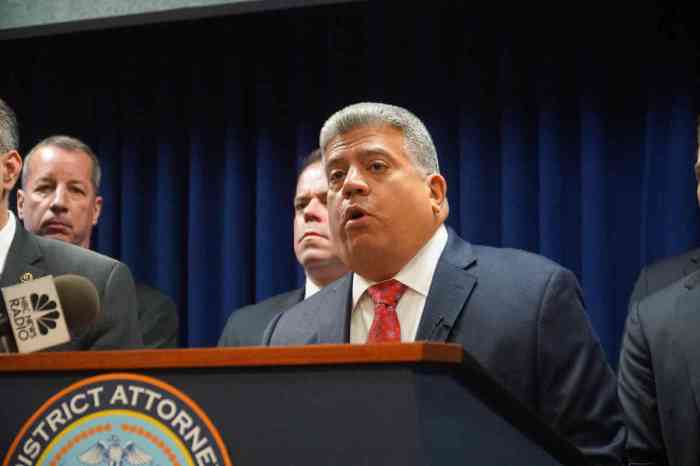Brooklyn District Attorney Eric Gonzalez will move to vacate the convictions of three men who were sentenced to 25 years to life in prison for the 1995 murder of subway token booth clerk Harry Kaufman, his office announced Friday.
The borough’s top prosecutor cited problematic identifications and false and contradictory confessions determined by a reinvestigation conducted by the DA’s Conviction Review Unit.
“The horrific murder of Harry Kaufman shocked our city and devastated a loving family, but the findings of an exhaustive, years long reinvestigation of this case leave us unable to stand by the convictions of those charged,” Gonzalez said in a statement. “Above all, my obligation is to do justice, and because of the serious problems with the evidence on which these convictions are based, we must move to vacate them and acknowledge the harm done to these men by this failure of our system.”
The defendants — James Irons, Thomas Malik and Vincent Ellerbe — will appear before Brooklyn Supreme Court Justice Matthew D’Emic Friday afternoon.
The men’s convictions stem from a November 1995 incident inside the subway station at Kingston Avenue and Fulton Street in Bedford-Stuyvesant. According to court records, two men approached the token booth where Kaufman was working at around 1:40 am on Nov. 26. One of the men poured gasoline from a clear plastic soda bottle into the coin slot. Then, either he or his accomplice lit a book of matches, igniting the gasoline and causing Kaufman’s booth to explode.
The subway worker was blown out of the booth and emerged engulfed in flames, which passersby attempted to extinguish. Kaufman suffered burns over 80 percent of his body and succumbed to injuries related to the blast two weeks later.
A witness reported seeing three men exit the station and flee the scene and, after an investigation, New York City Police Department detectives identified Irons, Malik and Ellerbe as suspects. All three confessed to taking part in the crime and were convicted by a jury largely based on those confessions, but following a reinvestigation of the case a quarter of a century later, Gonzalez says he cannot stand by the convictions. According to the DA’s office, the reinvestigation revealed “the problematic circumstances of the identifications, the myriad factual contradictions between the confessions and the evidence recovered at the scene, and the material contradictions between the confessions themselves.”
“My heart aches for the Kaufman family and my office remains resolute in our commitment to seek justice for victims, while ensuring fairness to all,” the DA said.
The review found that detectives Stephen Chmil and Louis Scarcella “fed key details to Irons,” who was just 18 at the time, showing him photographs of evidence found at the crime scene — which the cops later used at trial to argue that Irons’ confession was so detailed it should be trusted.
Furthermore, the review found that details of Irons’ confession were false, including his claim that gasoline was squirted on the door of the token booth — a fact negated by expert testimony from a fire marshal at one of the co-defendant’s trials, who said the gasoline was poured into the coin slot opening and nowhere else.
Malik, who was also 18 years old at the time, was identified by a witness as someone she saw holding the bottle of gasoline and entering the subway with another man, even though she had earlier identified Scarcella’s and Chmil’s top suspect — a different person who was not charged — as holding the bottle.
The DA’s office also found that Ellerbe, who was 17 at the time, similarly made a confession inconsistent with the facts and evidence of the case. Ellerbe said in his statement that he used a spray bottle to spray gasoline in an attempt to actually spray his street name, Teff, on the front of the token booth — which also contradicted the fire marshal’s claims related to the coin slot. The Conviction Review Unit eventually determined that if the booth had only been sprayed it would not have exploded.
The DA’s Conviction Review Unit has vacated 33 convictions since 2014, and has approximately 50 more investigations currently open.
Last June, the DA’s office vacated the conviction of a man who served nearly 19 years in prison for allegedly shooting at police officers.
Like his predecessor and mentor, the late Ken Thompson, he has pursued a number of criminal justice reforms in his tenure, such as declining to prosecute marijuana offenses and beefing up the Conviction Review Unit. Earlier this year, he announced a new pilot program focused on “restorative justice.”
























